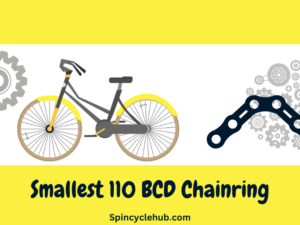Introduction
If you’re an avid cyclist who loves conquering challenging hills and mountainous terrain, you know the importance of having the right gear ratios to make your climbs more manageable. One component that can significantly enhance your climbing prowess is the chainring. In this article, we’re going to delve into the world of chainrings and specifically explore the smallest 110 BCD (Bolt Circle Diameter) chainring available. So, strap on your helmet and get ready to power up those steep ascents!
Understanding Chainrings and BCD
What is a Chainring?
A chainring is a vital component of your bike’s drivetrain system. It is the round, toothed disc located at the front of the crankset that engages with the chain, transferring your pedaling power to propel the bike forward.
What is BCD?
BCD stands for Bolt Circle Diameter. It refers to the measurement of the bolt holes on the chainring. The BCD determines the compatibility between the chainring and the crankset, ensuring they fit together seamlessly.
The Benefits of a Small 110 BCD Chainring
Improved Climbing Performance
When it comes to climbing, having a smaller chainring can be a game-changer. A small 110 BCD chainring allows you to achieve lower gear ratios, making it easier to spin your pedals and maintain a steady cadence when tackling steep inclines. This translates to improved climbing efficiency and reduced strain on your legs.
Customizable Gear Ratios
By opting for a smaller 110 BCD chainring, you gain more flexibility in customizing your gear ratios. You can pair it with a larger cassette on the rear wheel, providing a wide range of gears to handle various terrains. This versatility allows you to adapt to different gradients and maximize your performance on both ascents and descents.
Lightweight Advantage
Smaller chainrings, including those with a 110 BCD, tend to be lighter compared to their larger counterparts. Shedding a few grams can make a noticeable difference, especially during prolonged climbs where every ounce counts. A lighter chainring means less rotational weight and a more responsive bike, enabling you to accelerate faster and maintain momentum on demanding uphill sections.
Factors to Consider When Choosing a Small 110 BCD Chainring
Number of Teeth
The number of teeth on the chainring determines the gear ratio it offers. Smaller chainrings typically have fewer teeth, providing lower gear ratios suitable for climbing. However, it’s essential to strike a balance between your climbing needs and the gear ratios required for other terrains you frequently encounter.
Compatibility with Cranksets
When selecting a small 110 BCD chainring, ensure it is compatible with your crankset. Different cranksets have specific BCD measurements, and it’s crucial to match them to ensure a proper fit. Check the manufacturer’s specifications or consult with a knowledgeable bike mechanic to ensure compatibility.
Material and Durability
Chainrings are made from various materials, including aluminum, steel, and carbon fiber. Each material has its own strengths and weaknesses in terms of durability, weight, and cost. Consider your riding style, budget, and desired balance between weight and longevity when choosing the material for your small 110 BCD chainring.
Installation and Maintenance Tips
Professional Installation
Installing a chainring can be a straightforward process, but if you’re unsure or unfamiliar with bike mechanics, it’s best to have it done by a professional. Proper installation ensures optimal performance and minimizes the risk of damage to your bike’s drivetrain.
Regular Cleaning and Inspection
To extend the lifespan of your chainring, it’s important to keep it clean and regularly inspect it for signs of wear. Remove any dirt or debris that may accumulate between the teeth, and check for any bent or damaged areas. If you notice significant wear or damage, it’s advisable to replace the chainring to maintain smooth and efficient shifting.

Conclusion
When it comes to conquering steep climbs and maximizing your cycling performance, the smallest 110 BCD chainring can be your secret weapon. With its ability to provide lower gear ratios and improve climbing efficiency, it allows you to take on challenging ascents with confidence. Just remember to consider factors such as the number of teeth, compatibility with your crankset, and the material’s durability when selecting the perfect chainring for your riding style. So, gear up, embrace the hills, and let the smallest 110 BCD chainring unleash your climbing power!
FAQs (Frequently Asked Questions)
Q1: Can I install a small 110 BCD chainring on any bike?
A1: Not all bikes are compatible with a small 110 BCD chainring. You need to ensure that your crankset is designed to accommodate this specific chainring size.
Q2: How do I know the number of teeth suitable for my riding needs?
A2: The number of teeth on the chainring depends on various factors, including your fitness level, terrain, and riding style. It’s best to consult with experienced cyclists or bike mechanics who can provide personalized recommendations.
Q3: Will a smaller chainring affect my top speed?
A3: Yes, opting for a smaller chainring will result in a lower top speed. However, the trade-off is improved climbing performance and a wider range of gear ratios.
Q4: Can I replace just the chainring without changing the entire crankset?
A4: In most cases, you can replace only the chainring without changing the entire crankset. However, it’s important to ensure compatibility between the new chainring and your existing crankset.
Q5: How often should I replace my chainring?
A5: The lifespan of a chainring depends on various factors, including usage, maintenance, and the material it’s made from. Regularly inspect your chainring for signs of wear, and if you notice significant damage or deterioration, it’s time for a replacement.
Watch this one,
Video Credits –GCN Tech
DOWNLOAD THIS ARTICLE :Smallest 110 BCD Chainring
You May Also Like
- Understanding the 48:16 Gear Ratio: Exploring the Mechanics and Applications
- Fuji Del Rey Bike: Exploring the Versatile Classic
- Schwinn Le Tour 3: The Perfect Ride for Cycling Enthusiasts
- Schwinn Caliente Road Bike: Unleash Your Inner Road Warrior



